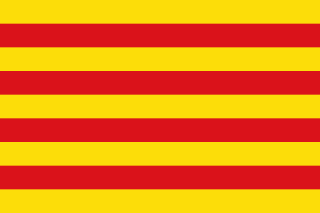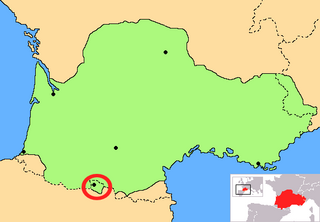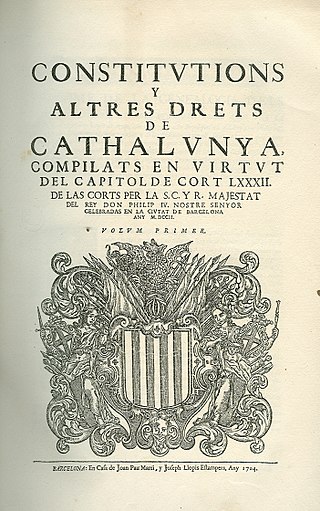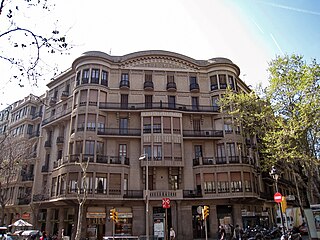| |||||
| Decades: | |||||
|---|---|---|---|---|---|
| See also: | |||||
Events from 1919 in Catalonia .
| |||||
| Decades: | |||||
|---|---|---|---|---|---|
| See also: | |||||
Events from 1919 in Catalonia .

Catalan, known in the Valencian Community and Carche as Valencian, is a Western Romance language. It is the official language of Andorra, and an official language of two autonomous communities in eastern Spain: Catalonia and the Balearic Islands. It is also an official language in Valencia, where it is called Valencian. It has semi-official status in the Italian comune of Alghero, and it is spoken in the Pyrénées-Orientales department of France and in two further areas in eastern Spain: the eastern strip of Aragon and the Carche area in the Region of Murcia. The Catalan-speaking territories are often called the Països Catalans or "Catalan Countries".

Catalonia is an autonomous community of Spain, designated as a nationality by its Statute of Autonomy.

Catalan nationalism is the ideology asserting that the Catalans are a distinct nation.

Aranese is a standardized form of the Pyrenean Gascon variety of the Occitan language spoken in the Val d'Aran, in northwestern Catalonia close to the Spanish border with France, where it is one of the three official languages beside Catalan and Spanish. In 2010, it was declared the third official language in Catalonia by the Parliament of Catalonia.

Esteban Terrades i Illa also known as Esteve Terradas, was a Spanish mathematician, scientist and engineer. He researched and taught widely in the fields of mathematics and the physical sciences, working not only in his native Catalonia, but also in the rest of Spain and in South America. He was also active as a consultant in the Spanish aeronautics, electric power, telephone and railway industries.

The Commonwealth of Catalonia was a deliberative assembly made up of the councillors of the four provinces of Catalonia. Promoted in its final stages of gestation by the Regionalist League of Catalonia, it was strongly endorsed by municipal referendum in October 1913.

The Catalonia national football team is the official football team of Catalonia. It is organised by the Catalan Football Federation, founded in 1900. The team has been referred to by various names including Selecció Catalana, Selecció de Barcelona and the Catalan XI.

The Parliament of Catalonia is the unicameral legislature of the autonomous community of Catalonia, Spain. The Parliament is currently made up of 135 members, known as deputies (diputats/deputats/diputados), who are elected for four-year terms or after extraordinary dissolution, chosen by universal suffrage in lists of four constituencies, corresponding to the Catalan provinces. The Parliament building is located in Ciutadella Park, Barcelona.

The Catalan constitutions were the laws of the Principality of Catalonia promulgated by the Count of Barcelona and approved by the Catalan Courts. The Corts in Catalan have the same origin as courts in English but instead meaning the legislature. The first constitutions were promulgated by the Corts of 1283. The last ones were promulgated by the Corts of 1705. They had pre-eminence over the other legal rules and could only be revoked by the Catalan Courts themselves. The compilations of the constitutions and other rights of Catalonia followed the Roman tradition of the Codex.
Regionalist League of Catalonia was a right wing political party of Catalonia, Spain. It had a Catalanist, conservative, and monarchic ideology. Notable members of the party were Enric Prat de la Riba, Francesc Cambó, Agustí Riera i Pau, Joan Ventosa and Ramon d'Abadal i Calderó.
The Statute of Catalonia of 1919 started in a pro-autonomist environment and was approved by the Assembly of the Commonwealth of Catalonia in Barcelona, on 24 January 1919 with the support of several Catalan parties: The Partit Català Republicà took this Statute as its main concern, Alejandro Lerroux's radicals endorsed it, Francesc Cambó and his party asked for a pragmatic vision. Liberals and Conservatives went against central party policy, and the Traditionalists remembered his defense of autonomy with weapons. Francesc Macià -speaking as a supporter of independence- said that this was a short Statute, but the best one that could be achieved. Finally, Largo Caballero, speaking as a Socialist, stated that Spanish workers believed that Catalan Autonomy was the first step in the regeneration of Spain.

Camp d'Esports is a multi-use stadium in Lleida, Catalonia. It is currently used mostly for football matches and is the home ground of Lleida Esportiu. The stadium holds 13,500 seats, and the dimensions for the football field are 102x68 meters. The architect responsible for the project was Adrian Florensa.

Eugenio d'Ors Rovira was a Spanish writer, essayist, journalist, philosopher and art critic. He wrote in both Catalan and Spanish, sometimes under the pseudonym of Xènius.

Noucentisme was a Catalan cultural movement of the early 20th century that originated largely as a reaction against Modernisme, both in art and ideology, and was, simultaneously, a perception of art almost opposite to that of avantgardists. In 1906, Eugenio d'Ors coined the term following the Italian tradition of naming styles after the centuries and using the homonyms nou (nine) and nou (new) to suggest it was a renovation movement. The same year two essential works for Noucentisme were published: Els fruits saborosos by Josep Carner and "La nacionalitat catalana" by the Conservative politician Enric Prat de la Riba.

Enric Prat de la Riba i Sarrà was a Catalan politician, lawyer and writer. He was a member of the Centre Escolar Catalanista, where one of the earliest definitions of Catalan nationalism was formulated. He became the first President of the Commonwealth of Catalonia on 6 April 1914 and retained this office until his death. He wrote the book and political manifesto La nacionalitat catalana in which greater autonomy to Catalonia was advocated. He died in 1917 and is interred in the Montjuïc Cemetery in Barcelona.

The Statistical Institute of Catalonia is the official body responsible for collecting and publishing statistics in the autonomous community of Catalonia, Spain. The institute comes under the Department of the Economy and Finances of the Generalitat de Catalunya.

Rubí is a municipality in Catalonia (Spain), in the comarca of Vallès Occidental and the province of Barcelona, 15 kilometers from Barcelona. It is bordered on the north by Terrassa and Ullastrell, on the south by Sant Cugat del Vallès, on the west by Castellbisbal and on the east by Sant Quirze del Vallès.

The Library of Catalonia is the Catalan national library, located in Barcelona, Catalonia, Spain. The primary mission of the Library of Catalonia is to collect, preserve, and spread Catalan bibliographic production and that related to the Catalan linguistic area, to look after its conservation, and to spread its bibliographic heritage while maintaining the status of a center for research and consultation.

El Poal is a village of Pla d'Urgell, Catalonia, Spain.
The Statute of Autonomy of Catalonia of 2006 provides Catalonia's basic institutional regulations under the Spanish Constitution of 1978. It defines the rights and obligations of the citizens of Catalonia, the political institutions of the Catalan community, their competences and relations with the rest of Spain, and the financing of the Government of Catalonia.